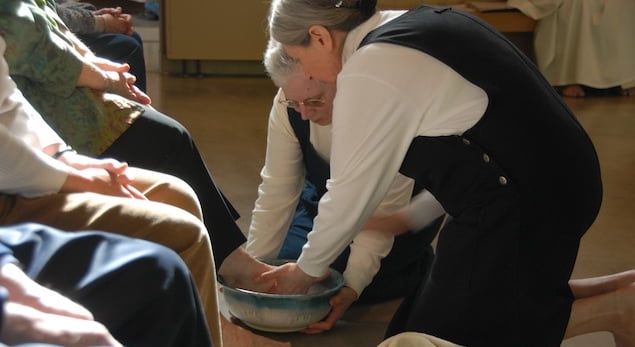Chapter Talk – Holy Thursday – April 9, 2020
‘Jesus fulfilled God’s will through his obedience to God’s covenant of love’: these words are the collect that have been sung at the office this week…In Jesus’ last days we witness like a bas relief image the love bond between Father and Son…this love bond was sealed at Jesus’ baptism in the Jordan: ‘You are my Son, the Beloved’ (Mk 1:11) and again at the Transfiguration: ‘This is my Son, the Beloved. Listen to him’ (Mk 9:8). This love bond, this covenant of love is the living ground for Jesus’ self-gift…In today’s liturgy we behold Jesus’ self-gift in the washing of the feet ritual and in the Eucharist where Jesus offers his body and his blood for the world. Self-giving is an act of agape: unconditional love, the highest form, the deepest form of love…This is the diptych of today’s two rituals and of what we will be participating in.
Hans Urs von Balthasar says the gospel of John for this Holy Thursday does not focus on the institution of the Eucharist, rather it concentrates “on Jesus’ inner attitude at his self-giving to the Church and world” (Light of the Word, p.64). And this we see in the washing of his disciples’ feet. He goes on to say that this event “opened the disciples’ eyes to perceive what really did happen in the institution of the Eucharist and what really happens in each Eucharist celebrated since” (p.64). As followers of Jesus, as disciples we are to grow into his mind and heart. What is Jesus communicating to his disciples and to us as we behold these examples of his self-gift? One essential reality for us to hold in our consciousness is that the initiative of love has first come from God. In reflecting on the theology of Fr. Christian de Cherché, Christian Salenson writes: “The human gift of self, in Christian revelation, is never primary. It is secondary. The initiative of love comes not from humankind but from God. Was it not God who loved us first?” (A Theology of Hope, p.165). Our self-gift is ‘secondary’. This is NOT to say that it is of less value. No. It does say, however, that we have been loved first by God and this love is what is behind our self-gift…The spiritual force (the Divine force) behind our self-gift is God’s love, a love we have received and a love that now motivates us to do the same: to give our lives totally in service and in love…The fact that the initiative lies with God in this love exchange is pivotal. It becomes an antidote, a medicine against any egoism that might creep in through our self-offering. This medicine transforms attitudes like: ‘Look what I did’; or, ‘I did this, so what reward will I get’; or, ‘will he or she like me better or give me something for what I just did’.
In John’s gospel the evangelist writes: ‘having loved his own who were in the world, he loved them to the end’ (Jn 13:1). Pope Benedict XVI in his book, Jesus of Nazareth Holy Week: From the Entrance Into Jerusalem to the Resurrection, tells us that agape is the Greek word used to describe “the love that reached to the end” (p.54). Pope Benedict goes on to say: ‘Love is the very process of passing over, of transformation, of stepping outside the limitations of fallen humanity—into which we are all separated from one another…into an infinite otherness. ‘Love to the end’ is what brings about the seemingly impossible…stepping outside the limits of one’s closed individuality, which is what agape is—breaking through into the divine” (p.54-55). Agape love breaks through any self-centeredness and draws us beyond any ego demand or claim into the heart of God, which is Love.
Most often we think of ‘sacrifice’ as something we do for God and for one another. The self-offering, which I have been referring to, is a shift from this attitude. The initiative in offering the gift of our lives, daily and totally, comes from God, the One who loved us first. Christian Salenson emphasizes this as he reflects on the life and thinking of Christian de Cherché. He writes: “We are made partners in the paschal mystery. Every person…who lives a life given in love bears witness to Christ” (A Theology of Hope, p.164). And this self-gift is a witness, he adds to the “antecedent love of God” (p.166).
In our encounter with Jesus during these days, this is what we will be participating in: Jesus’ total self-gift, given to God and given to us…In and through Jesus, we will learn more what agape love is and what it means to be partners with him in the paschal mystery. Let us hold this close to our hearts: Jesus’ self-gift and agape love are at the center of the Holy Triduum and they embody the whole gospel journey of life, death and resurrection. He goes before us now and let us follow, humbly and faith filled.


